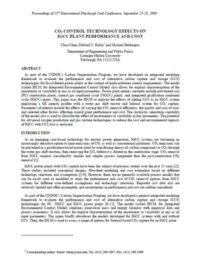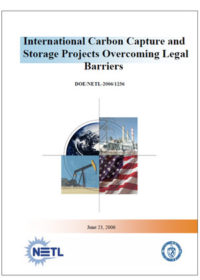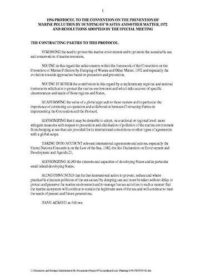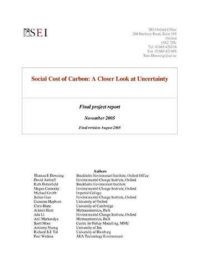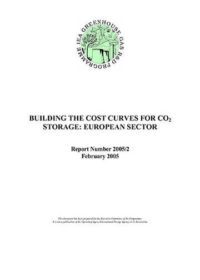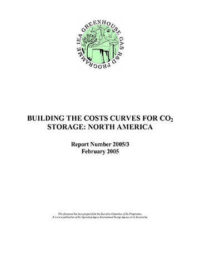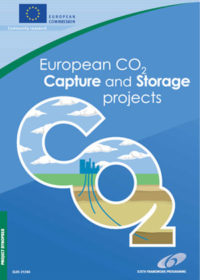Resources
Publications
Our publications, reports and research library hosts over 500 specialist reports and research papers on all topics associated with CCS.
View our Publication Library Disclaimer.
Filter by
CO2 control technology effects on IGCC plant performance and cost
25th September 2006
Topic(s): CO2 capture, Economics
Disclaimer
The content within the Global CCS Institute Publications, Reports and Research Library is provided for information purposes only. We make every effort and take reasonable care to keep the content of this section up-to-date and error-free. However, we make no claim as to its accuracy, currency or reliability.
Content and material featured within this section of our website includes reports and research published by third parties. The content and material may include opinions and recommendations of third parties that do not reflect those held by the Global CCS Institute.
International carbon capture and storage projects: overcoming legal barriers
23rd June 2006
Topic(s): Carbon capture use and storage (CCUS), Policy law and regulation
This paper examines regulatory developments of major CCS projects to determine actual progress in regulating such projects. There are five case studies of CCS projects that range from enhanced resource recovery to direct storage and which have been developed for a mix of purposes, such as commercial, research and development, and pilot demonstrations. These case studies indicate that regulatory progress varies greatly among projects, and differs depending on the size, scope, and the location of the projects. The focus of this report is the legal and regulatory context for international projects, but it should be recognised that CCS field projects in the United States are also addressing many of the regulatory issues related to CCS.
Disclaimer
The content within the Global CCS Institute Publications, Reports and Research Library is provided for information purposes only. We make every effort and take reasonable care to keep the content of this section up-to-date and error-free. However, we make no claim as to its accuracy, currency or reliability.
Content and material featured within this section of our website includes reports and research published by third parties. The content and material may include opinions and recommendations of third parties that do not reflect those held by the Global CCS Institute.
1996 protocol to the convention on the prevention of marine pollution by dumping of wastes and other matter, 1972 and resolutions adopted by the special meeting
24th March 2006
Topic(s): Health safety and environment
Disclaimer
The content within the Global CCS Institute Publications, Reports and Research Library is provided for information purposes only. We make every effort and take reasonable care to keep the content of this section up-to-date and error-free. However, we make no claim as to its accuracy, currency or reliability.
Content and material featured within this section of our website includes reports and research published by third parties. The content and material may include opinions and recommendations of third parties that do not reflect those held by the Global CCS Institute.
1996 protocol to the convention on the prevention of marine pollution by dumping of wastes and other material, 1972
1st January 2006
Topic(s): Health safety and environment
1996 protocol to the convention on the prevention of marine pollution by dumping of wastes and other material, 1972
Disclaimer
The content within the Global CCS Institute Publications, Reports and Research Library is provided for information purposes only. We make every effort and take reasonable care to keep the content of this section up-to-date and error-free. However, we make no claim as to its accuracy, currency or reliability.
Content and material featured within this section of our website includes reports and research published by third parties. The content and material may include opinions and recommendations of third parties that do not reflect those held by the Global CCS Institute.
The future of coal in a greenhouse gas constrained world
1st January 2006
Topic(s): Carbon capture use and storage (CCUS)
An interdisciplinary group of MIT faculty and research staff have participated in a study to assess the contribution coal can make to the growing world energy demand during a period of increasing concern about global climate change. The study looks out to the year 2050 and assesses technologies and policies we should pursue in the short-term so that we can utilize coal in the longer-term and reduce its associated CO2 emissions by at least 1 GtC. This paper summarizes the findings from three key components of the study: future coal use, coal conversion technologies, and CO2 sequestration. The full report will be available over the internet in summer of 2006.
Disclaimer
The content within the Global CCS Institute Publications, Reports and Research Library is provided for information purposes only. We make every effort and take reasonable care to keep the content of this section up-to-date and error-free. However, we make no claim as to its accuracy, currency or reliability.
Content and material featured within this section of our website includes reports and research published by third parties. The content and material may include opinions and recommendations of third parties that do not reflect those held by the Global CCS Institute.
Social cost of carbon: a closer look at uncertainty
1st November 2005
Topic(s): Economics, Social cost
Disclaimer
The content within the Global CCS Institute Publications, Reports and Research Library is provided for information purposes only. We make every effort and take reasonable care to keep the content of this section up-to-date and error-free. However, we make no claim as to its accuracy, currency or reliability.
Content and material featured within this section of our website includes reports and research published by third parties. The content and material may include opinions and recommendations of third parties that do not reflect those held by the Global CCS Institute.
Property interests and liability of geologic carbon dioxide storage
1st September 2005
Topic(s): CO2 storage, Liability
Carbon dioxide capture and storage involves the capture of carbon dioxide from a stationary source and injection into a suitable storage site. Increasing attention is being paid to the use of geologic formations as storage reservoirs for captured carbon dioxide. Property interests play a role in determining the cost of geologic storage through the acquisition of necessary geologic reservoir property rights and the value of storage through ownership of injected carbon dioxide. The determination of the ownership interest for the storage reservoir depends on whether carbon dioxide is being injected into a mineral formation, including depleted oil and gas reservoirs, unmineable coal seams, and oil reservoirs for enhanced oil recovery, in which case ownership determination is based on mineral law, or whether carbon dioxide is being into a deep saline formation, in which case the determination of property interests is influenced by water law. Acquisition of ownership rights over the formation may be done by voluntary methods, eminent domain, or adverse possession. Ownership over injected carbon dioxide will depend on whether a state subscribes to the ownership or non-ownership theory of injected gas. Liability concerning property rights may derive from several theories, including geophysical surface trespass, geophysical subsurface trespass, or liability from commingling of goods. Legislation on the state or federal level concerning property interests and eminent domain power may provide clarification over property interests and liability of geologic storage of carbon dioxide.
Disclaimer
The content within the Global CCS Institute Publications, Reports and Research Library is provided for information purposes only. We make every effort and take reasonable care to keep the content of this section up-to-date and error-free. However, we make no claim as to its accuracy, currency or reliability.
Content and material featured within this section of our website includes reports and research published by third parties. The content and material may include opinions and recommendations of third parties that do not reflect those held by the Global CCS Institute.
Building the cost curves for CO2 storage: European sector
17th February 2005
Topic(s): CO2 storage, Economics
The IEA Greenhouse Gas R&D Programme (IEA GHG) has been systematically evaluating the cost and potential for reducing emissions of greenhouse gases arising from anthropogenic activities, especially the use of fossil fuels. A mitigation technology that has been given particular attention is the capture and storage of CO2 originating from large stationary point sources. To date a series of studies have been undertaken, on a range of options for the storage of carbon dioxide.
This report reviews the development of a CO2 storage cost curve for Europe. The study has been carried out by The Netherlands Geological Survey (TNO-NITG) in co-operation with the geological surveys of Britain (BGS) and Denmark and Greenland (GEUS) and ECOFYS.
Disclaimer
The content within the Global CCS Institute Publications, Reports and Research Library is provided for information purposes only. We make every effort and take reasonable care to keep the content of this section up-to-date and error-free. However, we make no claim as to its accuracy, currency or reliability.
Content and material featured within this section of our website includes reports and research published by third parties. The content and material may include opinions and recommendations of third parties that do not reflect those held by the Global CCS Institute.
Building the cost curves for CO2 storage: North America
1st February 2005
Topic(s): Carbon capture use and storage (CCUS), CO2 storage, Economics
Disclaimer
The content within the Global CCS Institute Publications, Reports and Research Library is provided for information purposes only. We make every effort and take reasonable care to keep the content of this section up-to-date and error-free. However, we make no claim as to its accuracy, currency or reliability.
Content and material featured within this section of our website includes reports and research published by third parties. The content and material may include opinions and recommendations of third parties that do not reflect those held by the Global CCS Institute.
European CO2 capture and storage projects
10th September 2004
Topic(s): Carbon capture use and storage (CCUS)
This publication provides an overview of the European Commission’s Fifth Framework carbon capture and storage (CCS) programme (1999-2002) and a snapshot of CCS projects funded under the Sixth Programme (2002-2006).
Disclaimer
The content within the Global CCS Institute Publications, Reports and Research Library is provided for information purposes only. We make every effort and take reasonable care to keep the content of this section up-to-date and error-free. However, we make no claim as to its accuracy, currency or reliability.
Content and material featured within this section of our website includes reports and research published by third parties. The content and material may include opinions and recommendations of third parties that do not reflect those held by the Global CCS Institute.
